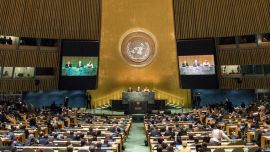At this moment the media (not to mention the social media) will be buzzing with the fallout from President Javier Milei’s maiden state-of-the-nation speech last night, a stampede which this newspaper is unable to join because the proximity to the witching hour leaves it well beyond our press time. Being unable to analyse the issue of the day, this editorial will turn to the issue of the week: the ongoing feud between the central and provincial governments.
The curtain for this conflict opens in the Patagonian province of Chubut, which can be termed both the match which lit the proverbial powder-keg and the tip of the iceberg (albeit horribly mixing metaphors). Big things have small beginnings often enough (this space has cited more than once the title of the German film Auch Zwerge haben klein angefangen – “Even dwarves started small”) and this multi-billion nationwide dispute started over a sum barely reaching eight digits in dollars being docked from the federal revenue-sharing transfers to a province with less people than at least three Greater Buenos Aires districts. Yet every province (except an opportunistic Tucumán) has closed ranks against any austerity drive at their expense on the eve of the parliamentary year commencing while the sums at stake include the FFF (Fondo de Fortalecimiento Fiscal) booster for Buenos Aires Province falling not far short of a trillion pesos.
If the spark that lit the fire was the threat of Chubut’s PRO Governor Ignacio Torres to cut off all oil and gas unless the cutbacks were reversed, this might appear a wild outburst from Argentina’s youngest governor but it was less random and accidental than it might seem. While Torres does not have any tap in his office enabling him to turn the oil and gas on or off, his was not an empty threat because a key factor in being elected governor last August was his alliance with the oil workers’ trade union leader Jorge ‘Lomo’ Ávila. The Peronist vote in the oil centre of Comodoro Rivadavia is a formidable force in any Chubut election, far outweighing the personal support for Torres in his native Trelew or his locally fledgling PRO, but the governor was able to surmount this obstacle with just 35 percent of the vote thanks to two factors – a freak storm hitting Comodoro Rivadavia on the eve of election and greatly reducing turnout but also the alliance with Ávila which is now coming back to haunt him. Voting against eight of the 13 articles of the omnibus bill which reached the House floor earlier this month to the extreme annoyance of President Milei, it is Ávila who has more capacity to turn off the oil and gas.
As the solidarity of other governors is already showing, tensions over the basic structures of the federal revenue-sharing issue unresolved in the three decades since the constitutional reform of 1994 are common to all provinces (and even City Hall here, which would now like to have back the money from the FFF created at its expense in 2020) but Chubut has one special feature perhaps explaining its current protagonism – while many provinces are in hock to the national government, Chubut’s previous debt-ridden Peronist provincial administration included its federal revenue-sharing cut as part of the guarantees of repayment, a clause which a far-right government obsessed with fiscal solvency and bent on retrenchment was only too eager to exploit.
Government supporters belittling Chubut, of whom Security Minister Patricia Bullrich is an extreme example with her “nobody lives there,” deserve every criticism but at the same time they could have a point. It is basically the smallest or least populated provinces which have this extreme dependence on federal revenue-sharing transfers at the expense of its most productive zones (Buenos Aires City and Province are constantly at odds over this issue when they could find common ground in being equally deprived of a fair share). When Argentina was first created over two centuries ago, every cabildo or town hall almost automatically became a province (which is why so many provinces have the same names as their capitals) but times have changed since then – we live in a semi-globalised world where metropolitan centres and regions are often more natural units than nations and provinces or counties and perhaps the time has come to consider redrawing the national map into regions.
But first attention will turn to whatever President Milei had to say last night.


















Comments